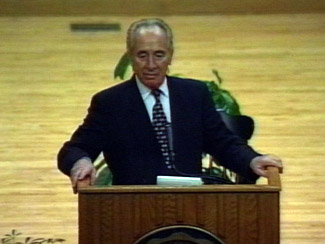Shimon Peres
![]() [Download Video: "View Video Clip of Shimon Peres' Ubben Lecture" - 558kb]
[Download Video: "View Video Clip of Shimon Peres' Ubben Lecture" - 558kb]
 November 11, 1996, Greencastle, Ind. - The man who helped shape the history of Israel and the future of the Middle East, former Israeli prime minister Shimon Peres, says peace always carries a cost. "In my view, you will have nothing for nothing, you will never have peace for nothing," he said during an appearance at DePauw University today. Peres, one of the great statesmen of the century and winner of the 1994 Nobel Peace Prize, presented the Timothy and Sharon Ubben Lecture at 7 p.m. in the Performing Arts Center, Kresge Auditorium. His topic was "Battling for Peace: The New Middle East." In the afternoon, he participated in a question-and-answer session with about 80 DePauw students in the Center for Contemporary Media, Watson Forum.
November 11, 1996, Greencastle, Ind. - The man who helped shape the history of Israel and the future of the Middle East, former Israeli prime minister Shimon Peres, says peace always carries a cost. "In my view, you will have nothing for nothing, you will never have peace for nothing," he said during an appearance at DePauw University today. Peres, one of the great statesmen of the century and winner of the 1994 Nobel Peace Prize, presented the Timothy and Sharon Ubben Lecture at 7 p.m. in the Performing Arts Center, Kresge Auditorium. His topic was "Battling for Peace: The New Middle East." In the afternoon, he participated in a question-and-answer session with about 80 DePauw students in the Center for Contemporary Media, Watson Forum.
"Unless you are willing to pay for it, you will never have peace," Peres told the crowd of approximately 1,000 at the Ubben Lecture. "The difference [between peace and war] is not in the cost, but in the result."
Peres also maintains that peace cannot be achieved without security. "Peace will lead to security, but security will not necessarily precede peace. Israel won five wars, but never attained peace. We look upon the existing proposal as a station on the road to a permanent solution, but not the permanent solution. But the road to peace is the only road that can exist. It may be longer, it may be more complicated , but I don't see any alternative."
The former prime minister added that peace and security are not possible without a partner. He praised the commitment of Yassar Arafat to the peace process.
Finally, Peres maintained that the peace process must move forward and criticized his successor, Benjamin Netenyahu, for trying to stall it. "He said, 'You should slow down the peace process.' If you slow down the peace process, you accelerate the anti-peace process. Most people refer to remember, rather than change. The forces of the existing situation are tremendously strong. It takes an effort to enable people to have a different view," Peres told his DePauw audience.
President Clinton received praise for his attempts to bring peace to the Middle East. "I have a very high opinion of President Clinton," Peres stated. "I think he is a great leader, not only of the United States, but for the world. He is a highly sophisticated with a great deal of warmth. I think that he grew with his job, and I feel comfortable with his philosophy and his ethics."
The world leader's visit also included a message for DePauw students. "I don't know why some people think you have to eat three times a day and you don't have to read three times a day. Reading is more important than eating if you want to survive intellectually."
In the 1970s, as Israel's minister of defense, Shimon Peres engineered the legendary Entebbe raid against PLO terrorists. In the 1980s, as prime minister, he saved the Israeli economy from near collapse. And as foreign minister and prime minister in the 1990s, Peres was the key architect of the historic Peace Accords.
In his recently released autobiography, Battling for Peace, Peres discusses how he was singled out by Israel's great leader, David Ben-Gurion, who appointed Peres, while still in his twenties, director general of the Ministry of Defense. From that point on, Peres' life was inseparable from his country's history.
Peres has been described by Amos Oz, one of Israel's leading men of letters, as a man with "an incisive sense of history, a creative imagination, a thirst for culture and a farsighted vision."